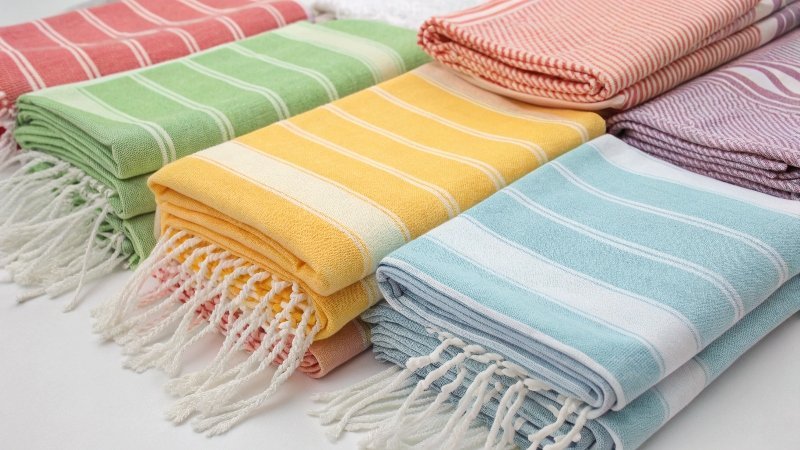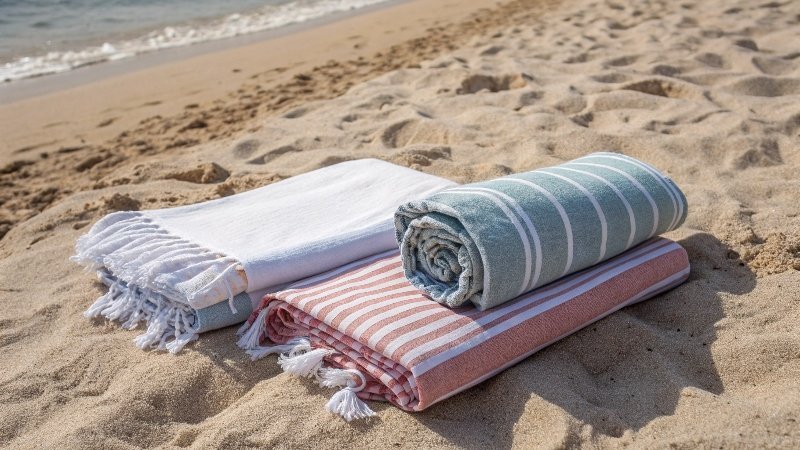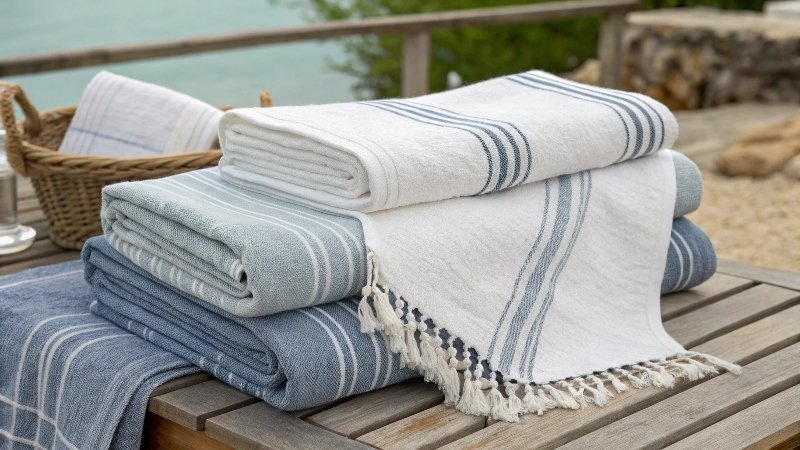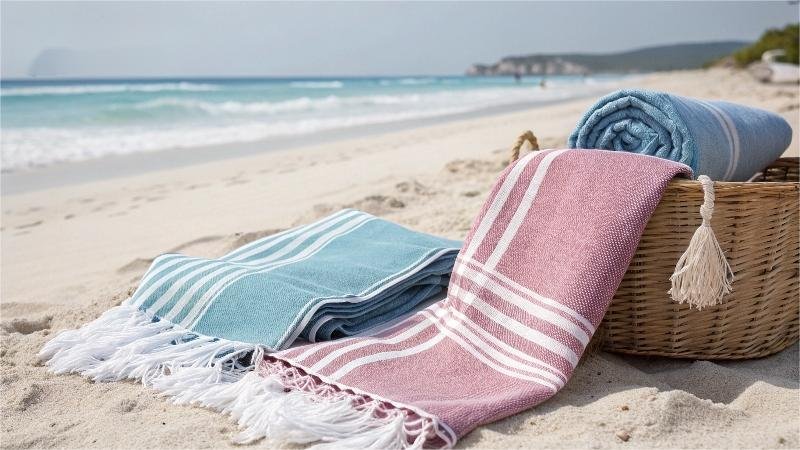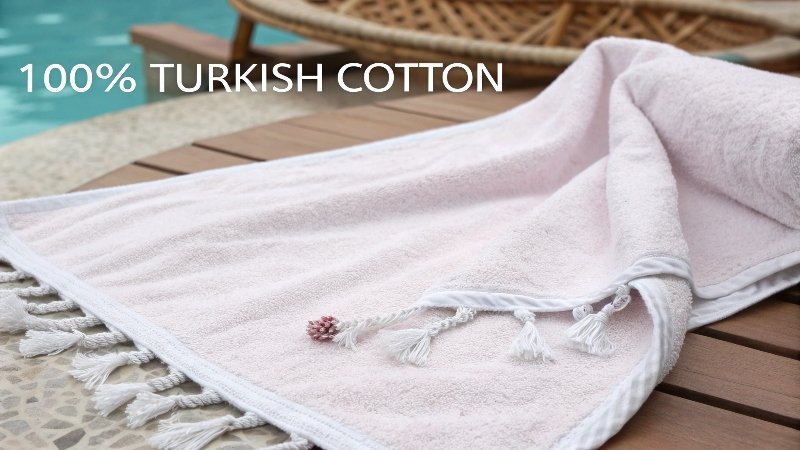Tired of bulky, slow-drying beach towels? They make your bag heavy and stay damp for hours. Turkish towels are the lightweight, quick-drying solution you need for a better beach day.
Turkish beach towels, or peshtemals, are special because they are made from long-fiber Turkish cotton. This makes them incredibly absorbent, quick-drying, and lightweight. They also become softer and more absorbent with every wash, making them a durable and practical choice for the beach.
I’ve seen countless towel trends come and go in my years in the textile industry. But the Turkish towel isn’t just a trend; it’s a staple with a rich history and practical benefits that make it perfect for modern use. You might be wondering if they’re really better than what you’re using now. Let’s break it down and look at what really sets them apart.
Are Turkish towels better for the beach?
Dragging a heavy, sand-filled terry towel from the beach is a hassle. It’s bulky and holds onto moisture. Turkish towels are a game-changer, offering a lighter, sand-resistant experience.
Yes, Turkish towels are often better for the beach. Their flat-woven, long-fiber cotton makes them lightweight, highly absorbent, and quick-to-dry. They also repel sand easily and pack down small, saving valuable space in your beach bag. This makes them more practical than bulky terry towels.
When you’re advising a brand on product development, you have to compare the options objectively. The classic terry cloth towel has its place, but for the beach, the Turkish towel has clear advantages. I remember a sourcing trip where we field-tested several towel types on a beach in Antalya. The terry towels were heavy to carry, collected sand like magnets, and were still damp hours later. The Turkish towels, however, were a revelation. They were light, sand shook right off, and they were bone dry after an hour in the sun. This practical performance is why they are a superior choice for beach-goers.
Turkish vs. Traditional Terry: A Beach Day Comparison
To make it clearer for my clients, I often use a simple table to show the differences. It helps decision-makers see the benefits at a glance.
| Feature | Turkish Towel (Peshtemal) | Traditional Terry Towel |
|---|---|---|
| Portability | Lightweight, folds up small | Bulky and heavy, especially when wet |
| Drying Time | Dries very quickly in sun/air | Stays damp for hours |
| Sand Resistance | Sand shakes off easily | Traps sand deep in the loops |
| Absorbency | Highly absorbent | Very absorbent, but holds water |
| Versatility | Can be a towel, wrap, or blanket | Primarily used as a towel |
This comparison shows why so many direct-to-consumer brands and boutique hotels are switching to Turkish towels for their beach and pool-side offerings. They offer a better user experience.
What is so special about Turkish towels?
You’ve probably seen those stylish, thin towels and wondered if they actually work. Are they just for looks? The secret to their performance lies in the unique properties of Turkish cotton.
What makes Turkish towels special is the Aegean-grown Turkish cotton used to make them. It has extra-long fibers, which create a fabric that is smooth, strong, and highly absorbent. This unique construction allows them to dry very quickly and become softer with each wash.
The magic is truly in the raw material. I’ve walked through cotton fields in the Aegean region of Turkey, and the quality of the cotton is what defines the final product. The term you need to know is "long-staple fiber." Think of it like building with longer bricks—you need less mortar, and the final structure is stronger and smoother. The same principle applies to cotton yarn.
The Science Behind the Fiber
Long-staple Turkish cotton fibers are spun into a yarn that has fewer connection points. This results in a towel that is incredibly smooth and durable. It won’t pill or become scratchy over time like towels made from shorter-staple cotton. In fact, the opposite happens. With each wash, the cotton fibers bloom slightly, making the towel even softer and more absorbent than when it was new. It’s one of the few products in the world that genuinely improves with age and use. The traditional flat weave, known as a peshtemal weave, complements the fiber perfectly. It creates a thin, lightweight fabric that maximizes surface area for quick drying, without sacrificing the absorbency that comes from the high-quality cotton itself.
Who makes the best Turkish beach towels?
Sourcing authentic Turkish towels feels overwhelming. With so many suppliers, how do you find a partner who delivers consistent quality? The key is to look for experience and verifiable credentials.
The best Turkish beach towels come from manufacturers in Turkey who specialize in traditional weaving and use certified, high-quality Aegean cotton. A great partner will offer transparency in their supply chain, hold certifications like OEKO-TEX, and have a proven track record of quality and reliability.
Finding the right manufacturing partner is the most critical step for any brand. The "best" maker isn’t just about the product; it’s about the entire partnership. As a brand owner or buyer, you need someone who understands your needs for quality, consistency, and scalability. I’ve seen many brands get burned by factories that promise the world but can’t deliver.
What to Look For in a Manufacturing Partner
Here’s what I advise my clients to look for:
- Authentic Materials: The partner must guarantee they use 100% long-staple Turkish cotton. Ask for specifics about the origin of their cotton. A good supplier will be proud to share this.
- Key Certifications: Look for certifications like OEKO-TEX STANDARD 100, which ensures the product is free from harmful chemicals. If sustainability is key for your brand, ask about GRS (Global Recycled Standard). These aren’t just logos; they are proof of a commitment to quality and safety.
- Manufacturing Control: The best partners, like us at TowelTrend, have deep control over the production process, from weaving and dyeing to finishing. This ensures consistency from your first small test order to a large-scale retail launch.
- Flexibility on MOQ: A major pain point for new brands is high Minimum Order Quantities (MOQs). Finding a factory that will work with a 100-piece test order is rare, but it’s something we’ve built our business on. It allows you to test the market without a huge financial risk.
How to tell if Turkish towels are real?
Worried about the authenticity of your Turkish towel samples? Selling a fake could damage your brand’s credibility. Luckily, you can spot a genuine towel with a few simple quality checks.
To tell if a Turkish towel is real, check the label for "100% Turkish Cotton." Feel the texture—it should be soft, not stiff. Inspect the tassels and edges; they should be hand-tied or neatly stitched. A real towel becomes more absorbent after a few washes.
I handle dozens of towel samples every month, and my hands can almost instantly tell the difference between authentic Turkish cotton and a cheap imitation. But you don’t need years of experience. You just need to know what to look for. Counterfeits are common, and they can hurt your brand’s reputation with your customers. Using a simple checklist can help you verify the quality of your product before you commit to a large order.
Your Authenticity Checklist
When samples arrive, don’t just look at them. Put them through these tests:
- The Touch Test: A new, authentic Turkish towel should feel soft. Some might have a slight crispness from the manufacturing process, but it should not feel stiff or coarse. A fake towel often uses cheaper, short-fiber cotton that feels rough from the start.
- The Wash Test: This is the most important test. Wash the towel once or twice. A genuine Turkish towel will get noticeably softer and more absorbent. A counterfeit will likely stay the same or even feel worse. Its absorbency will not improve.
- The Weave and Edge Inspection: Look closely at the fabric. The weave should be tight and consistent. The edges and tassels (if it has them) are big indicators of quality. On many traditional towels, tassels are hand-tied. The stitching should be neat and secure. Loose threads or uneven edges are red flags that point to poor craftsmanship.
- The Label Check: This is basic but crucial. The label should clearly state "100% Turkish Cotton" and ideally "Made in Turkey." If a supplier is hesitant to provide this, it’s a major warning sign.
Conclusion
Turkish towels are a superior choice for their absorbency, quick-dry nature, and portability. By knowing how to identify authentic quality, you can confidently source a product your customers will love.

